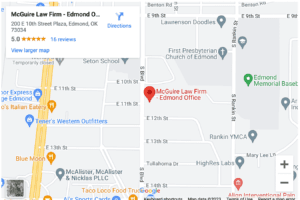Quadriplegia Injury Attorney in Oklahoma City

Doctors use quadriplegia to describe paralysis of all four limbs. Other terms used to describe this type of paralysis include tetraplegia and paralysis “from the neck down.”
Quadriplegia can result from diseases, infections, and tumors. But the most common cause of a quadriplegia injury includes car accidents, falls, workplace accidents, medical malpractice, and other accidents.
Here is some information about quadriplegia injuries and the compensation you can seek for their effects.
How Does a Quadriplegia Injury Happen?

The spine includes a passageway for the nerves that connect the body and the brain. This passageway, called the spinal canal, protects the spinal cord from injury.
But trauma can compromise the spinal canal and sever or compress the spinal cord. When the spinal cord gets severed, communication between the brain and body along those nerves will cease. This means that sensory signals from the body cannot reach the brain, and motor signals from the brain cannot reach the body.
The location of the spinal cord injury will determine the extent of the symptoms. If the spinal cord injury occurs in the back, the patient can experience paraplegia, a paralysis of the legs and lower abdomen.
If the spinal cord injury happens in the neck, the patient can experience quadriplegia.
Partial Quadriplegia and Quadriparesis
If the spinal cord gets partially severed, the patient might experience only partial paralysis. For example, paralysis might not stop all motor signals to the limbs.
Instead, it might only cause:
- Weakness
- Loss of coordination
- Numbness
This condition, called quadriparesis, might result in differing abilities in the limbs. Some limbs might have more motion and coordination than others.
Partial quadriplegia can also result in retention of some functions and loss of others. For example, you might still sense pressure but lose the ability to sense temperature.
It might also produce symptoms that improve over time. Doctors do not currently have the technology to repair severed nerves. But the body can reroute nerve signals through a process called neuroplasticity.
In partial quadriplegia, the brain and nervous system might regain some sensory and motor skills by rerouting signals from the severed nerves to the intact nerves.
Total Quadriplegia Injuries
Total quadriplegia results from a complete severing of the nerves between the brain and the limbs. In many cases, the nerves connecting the brain to the internal organs might also get severed.
This injury can cause the patient to lose some or all of their:
- Sensation
- Motor function
- Bladder and bowel control
- Temperature control
- Breathing control
- Swallowing control
The location of the severed nerves will determine the extent of the symptoms. The higher the injury, the more profound the symptoms are likely to be.
The cervical spine consists of seven vertebrae in the neck. The vertebrae are numbered C1 through C7, starting at the base of the skull.
C1-C3 Injury
A spinal cord injury from the base of the skull through the first three vertebrae will usually cause death. The nerves connecting the brain to the heart, lungs run through the C1 through C3 vertebrae.
If the patient survives the injury, the patient will probably need a ventilator or other device to assist breathing. Moreover, the patient might lose the ability to swallow. As a result, the patient might require assistance to eat and drink.
The patient will usually have no feeling or movement in the limbs. Oftentimes, the patient will lose the ability to speak.
C4 Injury
A spinal cord injury at or below the fourth vertebra is more survivable than an injury above it. A C4 injury will still produce profound paralysis, affecting the diaphragm, limbs, vocal cords, bowel, and bladder.
C5 Injury
A C5 injury leaves some of the nerves running to the upper torso intact. As a result, a patient with a C5 injury might be able to talk and breathe without assistance. The patient might lose motion and sensation in the hands, arms, and legs. However, the patient might have some control over their neck and shoulders.
C6-C7 Injury
Once the injury reaches the C6 and C7 vertebrae, the patient is more likely to experience paraplegia than quadriplegia. The patient might still lose some sensation and coordination in the hands, but the arms and shoulders might be unaffected. The patient might still lose the ability to control their legs, bladder, and bowel.
What Are the Risk Factors for a Quadriplegia Injury?
Quadriplegia can result from any accident that causes neck trauma. A broken neck, for example, might allow bone fragments to sever the spinal cord. The vertebrae might also displace when the neck gets broken, severing the spinal cord.
Some accidents where quadriplegia might happen include:
Traffic Accidents
Traffic accidents, including car accidents, motorcycle accidents, pedestrian accidents, and bicycle accidents, involve enormous amounts of energy. The energy can break vertebrae in the initial collision.
If the accident victim is ejected from the vehicle, they can break their neck in a secondary collision with the pavement.
Traffic accidents can also cause the spine to hyperextend during the impact. As the spine rebounds, the vertebrae can fracture. The bone fragments from the fracture can sever the nerves of the spinal cord.
Falls
Whether they happen at home, in a business, or at work, falls can result in fractured vertebrae. When the vertebrae of the neck fracture, the displaced vertebrae or bone fragments can cause quadriplegia.
What Compensation Can I Recover for a Quadriplegia Injury
A quadriplegia injury will probably require extensive medical treatment, therapy, and medication for the rest of your life. Fortunately, you can recover compensation for your medical expenses if your accident resulted from someone else’s negligence.
You can also recover compensation for your lost income. In many cases, someone with a quadriplegia injury will need to retire from work. Your damages can include your lost earning capacity for the rest of your working life.
You can also recover non-economic damages for pain, suffering, inconvenience, loss of activities, and loss of sexual relations. Since quadriplegia could substantially diminish your quality of life, you might recover substantial non-economic damages.
If you’ve been injured in an accident due to the negligence or intentional acts of another party, it’s important to pursue justice. By holding the other party accountable, you can get the compensation you need for your recovery.
Contact an Oklahoma City Personal Injury Lawyer for Help
Contact McGuire Law Firm to schedule a free consultation to learn more about the compensation you can seek for a quadriplegia injury. During your appointment, you’ll have the opportunity to speak with a knowledgeable Oklahoma City personal injury attorney to discuss the facts of your case and a strategy to move forward with the care and support you need.

